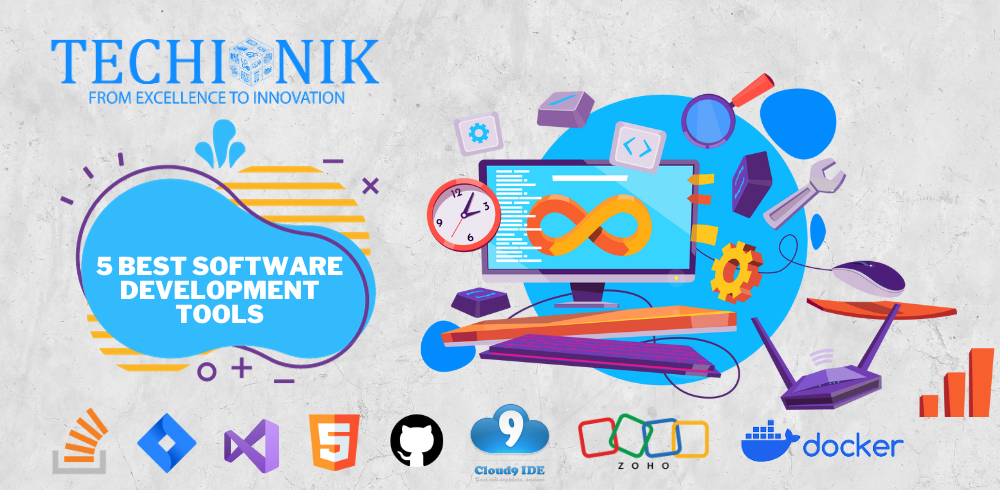Home / Blog

The importance of utilizing the right tools cannot be overstated. As technology advances, developers are constantly on the lookout for solutions that not only streamline their workflow but also enhance collaboration, code quality, and overall project efficiency. In this comprehensive exploration, we delve into the five best software development tools that are currently making waves in the industry, serving as indispensable assets for developers worldwide.
Visual Studio Code (VS Code), developed by Microsoft, has emerged as the quintessential code editor, redefining the developer experience. Its open-source nature, lightweight design, and extensive customization options make it a favourite among developers. Supporting a myriad of programming languages, VS Code provides a versatile platform for both novice and seasoned developers alike. One of its standout features is IntelliSense, an intelligent code completion tool that significantly accelerates coding by offering context-aware suggestions. With built-in Git integration, developers can seamlessly manage version control within the editor, further enhancing productivity. The vibrant ecosystem of extensions allows developers to tailor their environment to suit specific project requirements, making Visual Studio Code an unparalleled tool for modern software development.
Version control is the spine of cooperative software development. Git has become the industry standard for distributed version control systems. Developed by Linus Torvalds, Git enables developers to track changes in their code, collaborate effortlessly with team members, and manage various versions of their projects efficiently. When coupled with GitHub, a web-based hosting platform, Git becomes a potent combination for collaborative development. GitHub facilitates pull requests, issue tracking, and project management, creating a centralized hub for teams to collaborate seamlessly. Whether you're working on an open-source project or a private repository, Git and GitHub provide a robust foundation for version control and collaboration, ensuring a smooth and organized development process.
The paradigm shift toward containerization has revolutionized the software development and deployment landscape, with Docker leading the charge. Docker allows developers to encapsulate applications and their dependencies into lightweight containers, ensuring consistency across different environments. This eliminates the notorious "it works on my machine" dilemma, providing developers with a reliable and reproducible deployment environment. Docker containers are movable and can run on any system supporting Docker, fostering consistency in development and deployment processes. With Docker Compose, developers can define and manage multi-container applications, simplifying the orchestration of complex architectures. Whether dealing with microservices or monolithic applications, Docker streamlines the deployment process, enhances scalability, and fosters a more reliable software development lifecycle.
Effective project management is paramount in software development. Jira, developed by Atlassian, stands out as a comprehensive tool for agile project management. Jira offers a versatile platform for issue tracking, project planning, and team collaboration, catering to a range of project management methodologies, including Scrum and Kanban. Its customizable workflows and robust reporting capabilities empower development teams to adapt and scale their projects effectively. Jira seamlessly integrates with other Atlassian products, such as Confluence and Bitbucket, creating a unified ecosystem that enhances collaboration and communication. Whether you're a small startup or a large enterprise, Jira's flexibility and scalability make it an indispensable ally for managing software development projects efficiently from conception to delivery.
In the era of Continuous Integration (CI) and Continuous Deployment (CD), Jenkins stands as a stalwart open-source automation server, facilitating seamless integration and deployment processes. Jenkins automates vital aspects of the development lifecycle, including building, testing, and deployment, ensuring that changes are integrated smoothly into the project. With an extensive library of plugins and a robust community, Jenkins supports a wide array of technologies and workflows. Its adaptability allows it to integrate with version control systems like Git and platforms like Docker, providing a flexible and extensible CI/CD solution. Jenkins empowers development teams to achieve faster development cycles, reduce manual errors, and elevate the overall quality of their software through automated testing and deployment.
In the fast-paced and competitive terrain of software development, selecting a suitable set of tools is pivotal for success. The five tools discussed – Visual Studio Code, Git and GitHub, Docker, Jira, and Jenkins – collectively form a powerhouse that addresses various facets of the development lifecycle. From code editing and version control to project management and automation, these tools cater to the diverse needs of developers and development teams. As technology continues to grow, staying apprised about the latest tools and adopting them judiciously can significantly impact the efficiency and success of software development projects. Embrace these tools, experiment with their features, and empower your development team to create innovative, robust, and high-quality software solutions.